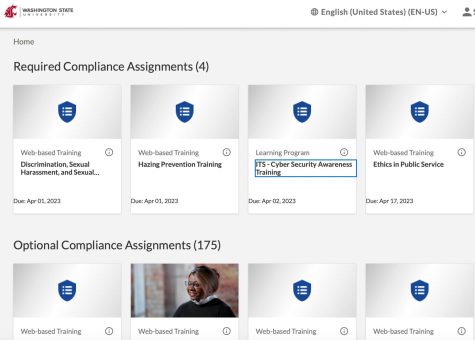WSU requires new annual ethics training
Training now required for all members of staff to take on an annual basis, meant to focus on Ethics Act violations.
February 17, 2023
WSU is now requiring an annual ethics training for all members of staff, in part to prevent violations of the Washington state Ethics in Public Service Act.
According to The Attorney General’s Office, The Ethics in Public Service Act “is aimed at avoiding conflicts between the official duties of state employees and their individual financial and personal interests, as well as preventing the misuse of state resources.”
Sharyl Kammerzell, chief compliance and risk officer, said the biggest change with this training is that it will be held annually instead of only being held once for each employee as it was before.
“One of the things it does is bring together a lot of the previous ethics policies we had into one place,” Kammerzell said. “The state of Washington has a really robust ethics law and they have a really robust ethics practice. We work hard to get the information our employees need to act in compliance with the Ethics Act and know where they have to go if they have questions.”
Kammerzell said this training is required for every employee at WSU. Previously, the training was required for employees within about nine months to a year of their initial employment.
“The date with which we all have to do the ethics training would be the same date. It would be, ‘do the training by [a certain date],’ it’s an online training,” she said.
The training should take employees about half an hour on average to complete, Kammerzell said. The idea of making this training annual has been talked about for about a few years.

After employees become more familiar with the annual ethics training, Kammerzell said WSU is hoping for fewer ethics complaints or potential violations of the Ethics Act.
“We hope people will be able to recognize a potential conflict of interests,” she said. “Just an increase in general of awareness of all the various elements of the Ethics Act.”
Kammerzell said it is a positive development that there has been more of a focus on annual trainings for WSU employees because it is often difficult to retain information from only one training.
Philosophy professor William Kabasenche said he has worked at WSU for over 15 years and he believes he did the original ethics training shortly after joining.
“There was a number of trainings I did in that time period,” he said. “WSU has a series of rules for the conduct of professors, so this training, there’s an effort being made by the university to make professors more regularly aware of what their ethical responsibilities are.”
“I do think it’s a good idea for faculty members to be reminded of their responsibilities. It’s the kind of thing that could fall out of your conscious awareness,” Kabasenche said. “I imagine that there may have been some folks who were found to be in violation of these rules and part of their defense was, ‘I wasn’t even aware that this was a responsibility that I had.’”
Some of the major issues this training is meant to keep members of staff up to date on all potential conflict of interest violations and conflict of commitment violations, Kabasenche said. While some members of staff may disagree, doing this training on an annual basis is a positive development.
“I think the ethical basis is that professors have responsibilities to the students, to WSU and to the taxpayers of the state,” he said. “I think that can be understood through the lens of the activities we are asked to participate in.”
















